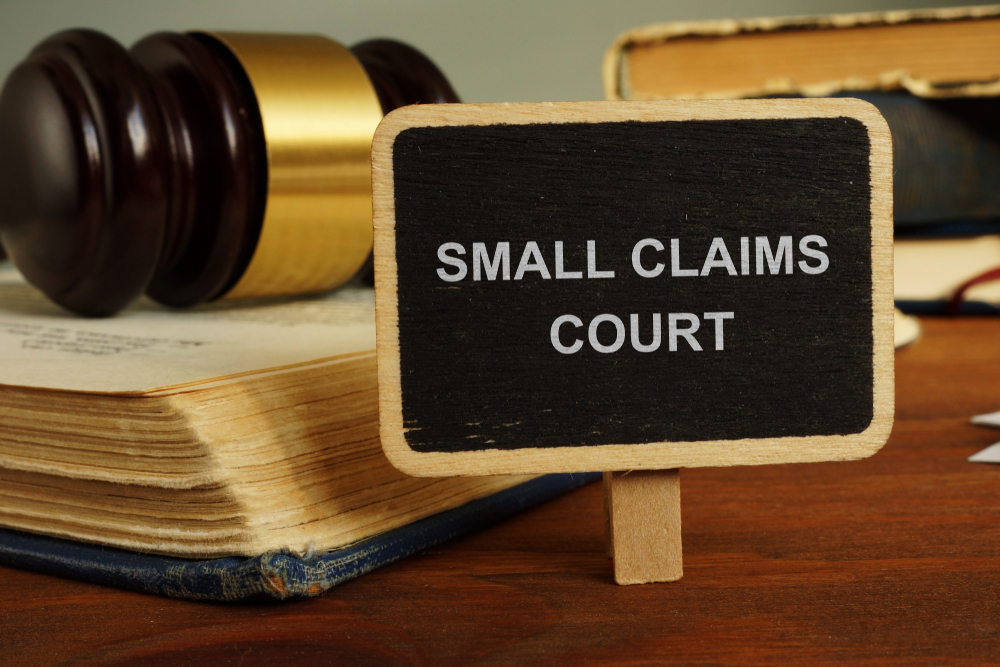Does someone owe you money, but you’ve given up trying to collect it because a lawyer’s fees would cost more than the amount of the debt?
There could be a solution in small claims court.
The court’s formal name, as well as its rules, differ slightly from state to state, but the concept is the same: a legal setting where people can settle financial disputes simply and quickly without having to hire a lawyer.
The only requirement is that your claim involve an alleged monetary loss that falls below limits set by individual states.
Small claims cases often arise from broken contracts, landlord-tenant disputes, property damages, personal injuries, health or safety hazards, product liability, professional malpractice and character defamation.
RELATED: Know your rights when it comes to shocking medical bills
RELATED: Collaborative divorce keeps couples out of the courtroom. What you should know.
Sometimes such claims can be quite unusual. One such case in Tennessee involving a man’s disappointment over a sold-out chicken sandwich has yet to go to trial.
Craig Barr, an automotive business owner, is suing a Popeye’s restaurant for running out of chicken sandwiches. Last August, he filed suit in the Hamilton County General Sessions Court, Tennessee’s small claims court, seeking $5,000 in damages for what Barr says is false advertising and deceptive business practices that wasted his time.
Resolution of the case was postponed when the coronavirus temporarily shut down the Tennessee court system.
As an institution, small claims courts arose in mid-1800s when New York revised its constitution to allow a “male citizen” to serve as his own lawyer in legal disputes.
This “quest for simplification of legal procedures” led to similar actions in a number of states, according to Eric H. Steele, author of “The Historical Context of Small Claims Courts,” published in the American Bar Foundation Research Journal.
Today, all states designate certain courts to adjudicate small claims and are usually found at the county or local level. States also limit the amount of damages that can be sought in small claims courts—limits that currently range from $2,500 in Kentucky and Rhode Island to $25,000 in Tennessee.
For example, in 2017, the District of Columbia Superior Court doubled the financial limit for small claims from $5,000 to $10,000.
“This change allows hundreds more civil cases to be resolved in the faster, inexpensive and informal Small Claims court setting. The court estimates that the change will provide improved access to justice by approximately 1,000 more cases to be filed in the Small Claims Branch each year,” Chief Judge Robert E. Morin explained at the time.
Similarly, Florida nearly doubled its small claims limit this year to $8,000 from the limit of $5,000 set in 1992. At the same time, Florida doubled the limits for civil suits (usually requiring representation by a lawyer) from $15,000 to $30,000 in county courts.
“More people will have more opportunity to file a small claims case with the increased dollar limits,” Paul Flemming, of the Office of the State Courts Administrator told the Orlando Sentinel in January. “This will provide access to the more straightforward and less complex rules and procedures of small claims cases.”
Other rules set by state legislatures or courts may apply as well, such as removing limits in disputes over residential security deposits or differentiating among the values of claims filed by individuals, businesses or public institutions.
How to file a small claims case
The first step in filing a small claims suit is to research the rules that apply in your state. Above all, you must be able to prove with documentary or other evidence that a debt is owed to you.
In Florida, Broward County Administrative Judge Robert W. Lee has published a 74-page annotated list of all the rules applying to small claims court proceedings in the state, which, he explains, “shall be construed to implement the simple, speedy and inexpensive trial of actions at law in county courts.”
Alternatively, if you don’t have the time to read and research this lengthy treatise, you might consider visiting your small claims court’s website where you should find procedures for filing a claim.
In Hillsborough County, Florida, for example, the Clerk of the Court provides a two-page instruction sheet for people seeking to collect a small debt. Here are just some of the clerk’s requirements:
- Claims for no more than $8,000 may be filed by anyone 18 or older against individuals, businesses, or corporations.
- The claim must be signed and witnessed by a notary or court clerk.
- Claim documents must include a cover sheet and multiple copies of the statement of claim, a summons for each defendant, and any exhibits or documents supporting the claim.
- Pre-payment of all court fees, including cost of servicing the summons, is required.
- A pretrial hearing will be scheduled within 30 to 50 days of the case being filed.
- If the plaintiff does not appear at the pre-trial hearing, the case might be dismissed and any fees paid forfeited. If the defendant does not appear, a judgment might be made in favor of the plaintiff. If the defendant denies the claim, the case is sent to mediation or set for a final hearing.
- There is no guaranteed collection of any judgment favoring the plaintiff.
What if you are sued?
Some three centuries ago, the American philosopher and theologian Jonathan Edwards wrote “There are always two sides to every story…” And that is what lawsuits are all about. The plaintiff has one story to tell and you, the defendant, may have another.
How you go about telling your story is another matter. The rules in each state can differ significantly.
In Arizona’s Justice Court, lawyers are barred from participating in a small claims case unless both parties agree. At the same time, there is no right to an appeal of the final judgment by the hearing officer or Justice of the Peace. If you lose the case, you may have to pay court costs and interest above the amount of the original claim.
The Florida Bar has published a “Consumer Pamphlet” that explains what to expect if you are sued in small claims court. It also warns that if you ignore such a lawsuit or fail to appear at scheduled hearings, the court will most likely order a judgment against you.
Other tips offered by the Florida Bar include:
- There must be proof that you actually owe and/or are responsible for a specific debt and that the suing party actually owns the debt.
- The debt may be subject to a statute of limitations.
- Debts previously discharged in bankruptcy proceedings usually cannot be pursued, unless they involve unpaid taxes, government fines, child support, alimony, student loans or some personal injury debts.
- You have the right to pay the debt before trial or to ask the court to approve a payment agreement or a settlement reducing the amount owed.
- You have the right to make a counter-claim against the debt holder or another potentially responsible party.
- If you lose the case, the court cannot directly force you to pay a debt, but may authorize garnishment of your wages, freezing of bank accounts or seizure of property.
Many courts require financial disputes to be mediated before judicial consideration. However, unless you have previously agreed to binding arbitration, you usually have the right to reject a mediated settlement and take the matter to trial.














